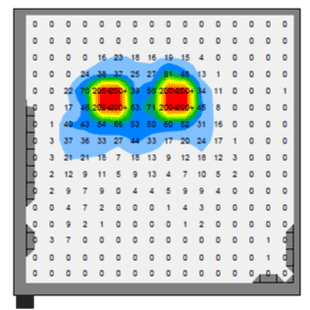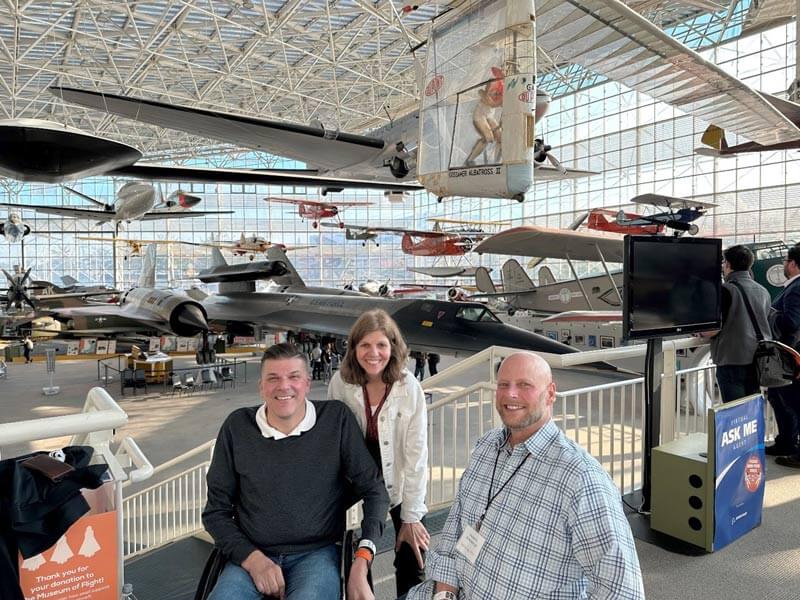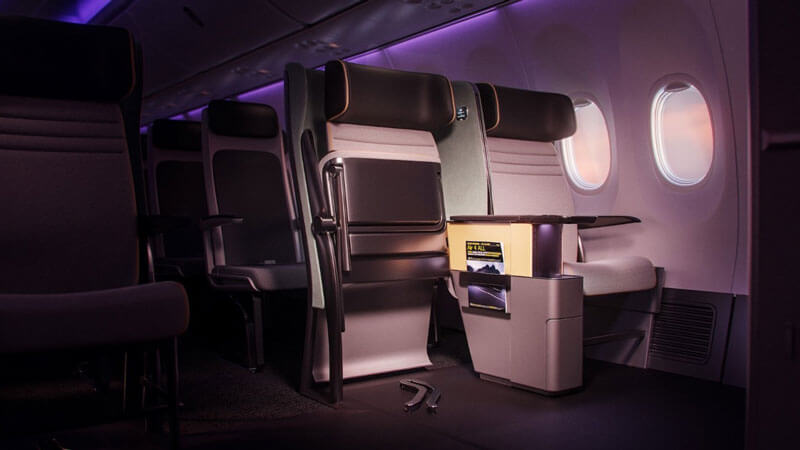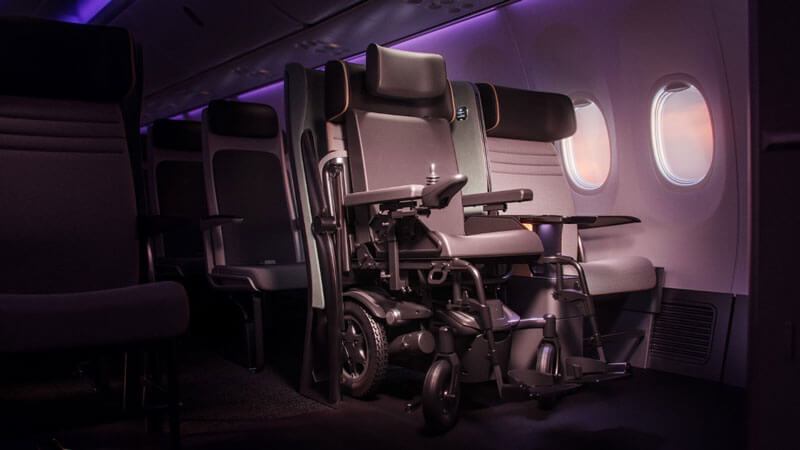At a plenary at the 2016 Vancouver International Seating Symposium, I presented research completed with Peter Axelson of Beneficial Designs about a survey pertaining to wheelchair travel with over 600 wheelchair riders, and the results of pressure mapping on boarding chairs and airline seats.1 The results of the 630-person survey included 91% having their wheelchair stored in the underbelly of the aircraft with 53% experiencing damage to their wheelchair. 61% experienced discomfort or instability when using the boarding chair, with 47% experiencing difficult transfers. Other complaints included pain, discomfort, and pressure issues when sitting in the aircraft seat.1 Pressure mapping comparing the individuals sitting on their own wheelchair and cushion against sitting on the boarding chairs or aircraft seats were significantly different.1,2 This work resulted in sharing the process of getting through the airport and onto the aircraft, including protection of the wheelchair, with professionals in the industry.4-7
 Research participant sitting on his seating cushion and wheelchair.
Research participant sitting on his seating cushion and wheelchair.
 Research participant sitting on a boarding chair without a wheelchair cushion. Note red spots which indicate significant pressure. Prolonged sitting on the boarding chair may lead to pressure wounds.
Research participant sitting on a boarding chair without a wheelchair cushion. Note red spots which indicate significant pressure. Prolonged sitting on the boarding chair may lead to pressure wounds.
These issues continue today. The FAA Reauthorization Act of 2018 mandates that airlines report the loss or damage of mobility equipment. In 2019, before the covid pandemic, it was reported that over 10,548 wheelchairs were damaged or lost.8-10 Sadly, disability advocate Engracia Figueroa died in 2021 after she developed a pressure wound after her wheelchair was damaged during transport and she had to use a suboptimal substitute wheelchair.11-12
There have been efforts to make positive changes for flying with a wheelchair with input from consumer groups like the Paralyzed Veterans of America (PVA) and United Spinal, as well as several airlines, RESNA, in-cabin manufacturers, and governmental agencies.
United States and United Kingdom Governmental Support
The United States Department of Transportation (DOT), under the leadership of Secretary of Transportation Pete Buttigieg, announced the Airline Passengers with Disabilities Bill of Rights and is working closely with the Air Carrier Act Advisory Committee. In July 2022, Secretary Buttigieg announced, "No other form of transportation - trains, buses, boats - require you to give up your mobility device when you board. The same ought to be true of airlines. So, in the months and years ahead, we plan to record a new rule that will allow passengers to stay in their personal wheelchairs when they fly. We know this won't happen overnight, but it is a goal we have to work to fulfill."13
Likewise, Sir Stephen Hillier, chair of the U.K. Civil Aviation Authority (CAA), stated, "We believe that everyone should have access to air travel, and we welcome the significant improvements in accessibility made by U.K. airlines and airports in recent years. In the last five years, the number of assistance requests have doubled, with passengers with reduced mobility and hidden disabilities now feeling more confident to travel. As the industry looks to recover from the effects of Covid-19 pandemic, we are keen to see innovative proposals which might further enhance the passenger journey."14
Two non-profit groups, All Wheels Up from the U.S. and Flying Disabled from the U.K., have led the way to advocate for the possibility of flying while in a wheelchair.
All Wheels Up
All Wheels Up is based in the United States and was founded by Michele Erwin in 2011 after experiencing difficulties traveling with her son, who has spinal muscular atrophy. Her dream was to be able to travel with her son staying in his wheelchair. When she presented this idea, she was often told that it could never happen due to the forces experienced when aircraft land. Michele refused to give up. All Wheels Up offered the Access Board proposals to test the feasibility of wheelchairs successfully flying on the aircraft. She worked with Calspan, a science and technology company, which was able to pass 16G dynamic testing on a restraint system. In 2021,13 The National Academies of Sciences, Engineering, and Medicine published their findings noting that "airplane interior space and structure should not present major technical challenges to an in-cabin securement system that could be implemented on a wide enough basis to afford users meaningful levels of flight service."15
In September 2022, All Wheels Up hosted a working group meeting in Seattle at the Museum of Flight. Research was presented focusing on the feasibility study, budget impact for aircraft designers and airlines, design ideas for aircraft cabin interiors, and the medical benefits of staying in a wheelchair during the flight. Sunrise Medical US sponsored three employees to attend. I was invited to be part of a panel discussion with Sheyna Gifford, M.D., and O. Okaniami, M.D., moderated by Christopher Lunsford, M.D., in which the medical benefits of staying in a wheelchair on flights were discussed in depth. Josh Anderson and Todd Vanderhoogt attended to provide their experiences of traveling with a wheelchair. The PVA, United Spinal, Department of Transportation, several universities, airlines, and Boeing were also in attendance. Participants actively contributed to planning ideas and interventions for the coming year with commitment to move forward with the goal of staying in a personal wheelchair during flight.
 Josh, Todd, and Jessica representing Sunrise Medical US at the All Wheels Up meeting
Josh, Todd, and Jessica representing Sunrise Medical US at the All Wheels Up meeting
Flying Disabled
Flying Disabled is based in the United Kingdom and was founded by Christopher Wood, who is the proud single parent of a son and daughter who use power wheelchairs. He has traveled the world to make commercial airlines accessible. Christopher Wood was awarded the very high honor of Member of the Most Excellent Order of the British Empire (MBE), which he received from Princess Anne for his work in accessible aviation. He works closely with the U.K. Department of Transportation and the Civil Aviation Authority. He is an advisor on accessibility and is part of Heathrow Airport's Advisory Group. Christopher is an active participant in Air 4 All,16 which "aims to revolutionise air travel for passengers with reduced mobility (PRM) by enabling powered wheelchair users to remain in their own wheelchair for the entire journey." Paul Priestman, designer at PriestmanGoode,16 demonstrated a design that will allow wheelchairs to remain on the aircraft in a way that allows typical seating to be used if there is not a wheelchair on the aircraft. This design system, called Air 4 All, was presented at the All Wheels Up meeting in 2022. Sunrise Medical UK is highlighted on the Air 4 All website as a major supporter of this effort.

 Air 4 All system design for in-flight wheelchair use
Air 4 All system design for in-flight wheelchair use
Reduced Mobility Rights Limited (RMR) was founded by Roberto Catigilioni, a father of a child with a disability. Its aim is to make all the travel industry segments and services disability-friendly and compliant with the UN Convention on the Rights of Persons with Disabilities. He created the website to establish a place for increasing awareness for safe disability travel. Catigilioni advocated for four amendments to the EU regulations for aviation, and he is active in the Scottish Parliament pertaining to this topic. He received the very high honor of Member of the Most Excellent Order of the British Empire (MBE).
Thank You
The persistence of these parents in their effort to make air travel safer for people with disabilities has changed the landscape for commercial air travel. After initially receiving eye rolls and excuses, there is now support and collaboration with governments, consumer groups, U.S. and U.K. airlines, aircraft manufacturers, in-cabin designers, wheelchair manufacturers, therapists, researchers, and engineers as demonstrated by their attendance at the working meetings hosted in both companies by All Wheels Up, Flying Disabled, and Reduced Mobility Rights Limited. Sunrise Medical salutes Michele Erwin, Christopher Wood, and Roberto Catigilioni for their work.
Specific details about developments pertaining to air travel with a wheelchair and Sunrise Medical's involvement will be presented by Jessica Presperin Pedersen and Faith Brown at the International Seating Symposium in April 2023. An updated blog and resource will be provided thereafter.
References
- Presperin Pedersen J, Axelson P. I'm leaving on a jet plane. I hope I'll see my chair again. Proceedings 32nd Annual International Seating Symposium 2016 Vancouver, Canada. 2016
- Presperin Pedersen J, Axelson P. Boarding devices and aircraft seats: Increasing safety, support and comfort. Proceedings 32nd Annual International Seating Symposium 2016 Vancouver, Canada. 2016
- Axelson PW, Preseperin Pedersen J. 2016. Boarding Devices and Aircraft Seats: Increasing Support and Comfort. Proceedings RESNA annual conference
- Presperin Pedersen J, Axelson P, Hurley-Kringen S. APMR 10/2019 100(10):e15-e16
- Presperin Pedersen J, Shea M Air Travel with a Wheelchair: What Seating Experts Should Know. Proceedings 33rd Annual International Seating Symposium 2017 Nashville, TN
- Presperin Pedersen J. Protecting the Wheelchair on a Commercial Flight: How People from the Wheelchair Industry Can Help. Directions Issue 2 2019 pages 27-34
- Presperin Pedersen, J. Air Travel with a Wheelchair: Occupational Therapy's Role in Facilitating Successful Flights. AOTA Continuing Education Article 2020
- Ansley H, Page, L. (2018) Access to air travel for passengers with disabilities: Improvements are on the horizon. Paralyzed Veterans of America Webinar
- Park MY. Airlines Now Required to report how many wheelchairs they break or lose. 2018 https://thepointsguy.com/news/airlines-wheelchairs-reporting-rule/ downloaded 12/10/2018
- (OAEP) USDoTsOoAEaP. Mishandled Wheelchairs and Scooters. February 2020 Air Travel Consumer Report. 2020:39-43. 2020
- Reyes, E.A. An airline broke an activist's wheelchair. Her death months later amplified calls for change. Los Angeles Times. (January 6, 2022). https://www.latimes.com/california/story/2022-01-06/la-activist-broken-wheelchair-airlines-death
- Brooks L. Disability Advocate Engracia Figueroa Died After An Airline Damaged her Wheelchair. Forbes 2021. forbes.com
- All Wheels Up https://www.allwheelsup.org/
- Flying Disabled https://www.flyingdisabled.org.uk/
- National Academies of Sciences, Engineering, and Medicine. Technical Feasibility of a Wheelchair Securement Concept for Airline Travel: A Preliminary Assessment. Washington, D.C.: The National Academies Press. https://doi.org/10.17226/26323.
- Air 4 All https://air4all.net/
- Reduced Mobility Rights Limited https://www.reducedmobility.eu/about-us.html
With over 40 years of clinical practice as an OT, Jessica Presperin Pedersen has worked in all sectors of the wheelchair and seating industry as a master clinician, supplier, manufacturing consultant, design representative, and educator. Dr. Presperin Pedersen was a pioneer in the development of the profession of wheelchairs and seating in the 1980s and has spent the last two decades contributing to the research world to demonstrate evidence for knowledge translation in the clinic, advocacy, and product development. She is a RESNA and AOTA Fellow, serves on the Clinician Task Force, the Seating and Wheeled Mobility Committee for AOTA, and has shared her experiences internationally through publications and presentations.